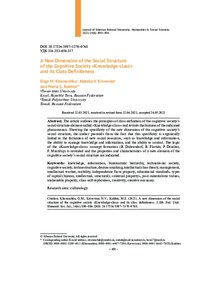Новое измерение социальной структуры когнитивного общества «knowledge-сlass» и его классовая определенность
Скачать файл:
URI (для ссылок/цитирований):
https://elib.sfu-kras.ru/handle/2311/141355Автор:
Хомушку, О. М.
Кривовяз, Н. В.
Кухта, М. С.
Khomushku, Olga M.
Krivoviaz, Natalia V.
Kukhta, Maria S.
Дата:
2021-06Журнал:
Журнал Сибирского федерального университета. Гуманитарные науки. Journal of Siberian Federal University. Humanities & Social Sciences; 2021 14 (6)Аннотация:
В статье обозначены принципы классовой определенности элемента
социальной структуры когнитивного общества, именуемого «knowledge-сlass»,
раскрыты особенности обозначенного феномена. Показывая специфику нового
измерения социальной структуры когнитивного общества, авторы исходят из того,
что эта специфика органично связана с формированием новых социальных
ресурсов, ими выступают знания и информация, возможность управления знаниями
и информацией, возможность контроля. Раскрыта логика формирования понятия
«knowledge-сlass
» (Р. Дарендорф, Р. Флорида, П. Друкер, Ф. Махлуп), обозначены
свойства
и характеристики нового элемента социальной структуры когнитивного
общества The article outlines the principles of class definition of the cognitive society’s social structure element called «Knowledge-class» and reveals the features of the indicated phenomenon. Showing the specificity of the new dimension of the cognitive society’s social structure, the author proceeds from the fact that this specificity is organically linked to the formation of new social resources, such as knowledge and information, the ability to manage knowledge and information, and the ability to control. The logic of the «Knowledge-class» concept formation (R. Dahrendorf, R. Florida, P. Drucker, F. Machlup) is revealed and the properties and characteristics of a new element of the cognitive society’s social structure are indicated
Коллекции:
Метаданные:
Показать полную информациюСвязанные материалы
Показаны похожие ресурсы по названию, автору или тематике.
-
Этико-правовые детерминанты охраны интеллектуальной собственности на корпоративном уровне в цифровой экономике
Кожевина, О. В.; Kozhevina, Olga V. (Сибирский федеральный университет. Siberian Federal University, 2022-07)Актуальность исследования обусловлена недостаточной изученностью этического подхода к охране объектов интеллектуальной собственности, включая результаты интеллектуальной деятельности (РИД). Цель – определение ... -
Flash Fiction by M.A. Tarkovsky in the Context of Traditionalism: the End of Direction vs. Different Prospect
Valyanov, Nikita A.; Вальянов, Н.А. (Сибирский федеральный университет. Siberian Federal University, 2016-05)Flash fiction of the contemporary Siberian writer M.A. Tarkovsky is considered by critics and literary scholars in the context of late traditionalism. The motive of chaos and loss of national / traditional, relevant for ... -
С Запада на Восток: две ветви мировой элиты
Карлова, О.А.; Karlova, Olga A. (Сибирский федеральный университет. Siberian Federal University., 2010-04)The subject matter or the article is research of the antinomy «intellectual - intelligent» in historical retrospective and prospective review. -
Unconscious Mechanisms of Social and Psychological Adaptation of Mentally Retarded Children
Chereneva, Elena A.; Черенева, Е.А. (Сибирский федеральный университет. Siberian Federal University., 2014-09)The paper is focused on one of actual problems of special psychology and pedagogics, which is studying identity of people with intellectual disability. The analysis of mechanisms of psychological protection and semantic ... -
Intellectual Type of Creativity (Poetry)
Plekhanova, Irina I.; Плеханова, И.И. (Сибирский федеральный университет. Siberian Federal University., 2015-06)On the example of poetry, this paper explores intellectual modus of creativity as expression of tendency of artistic thinking in the 20th century. Intellectualization is interpreted as “directed thinking” (C. G. Jung), ...

